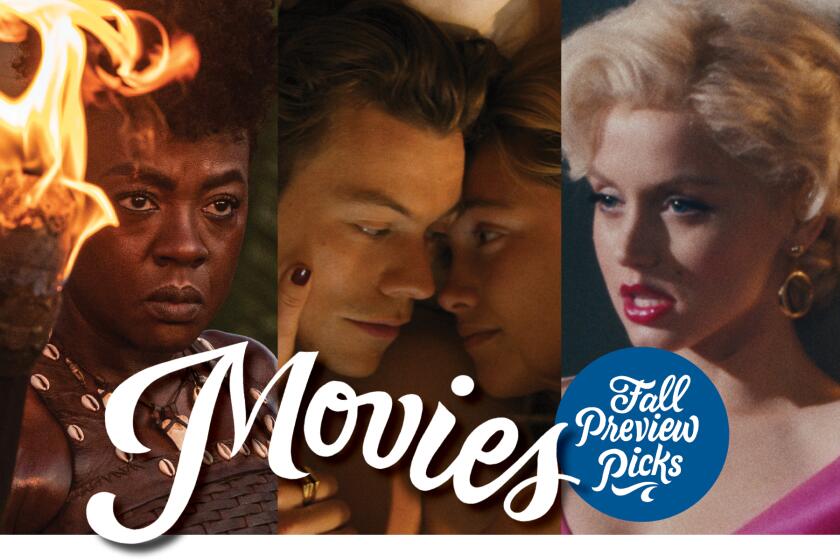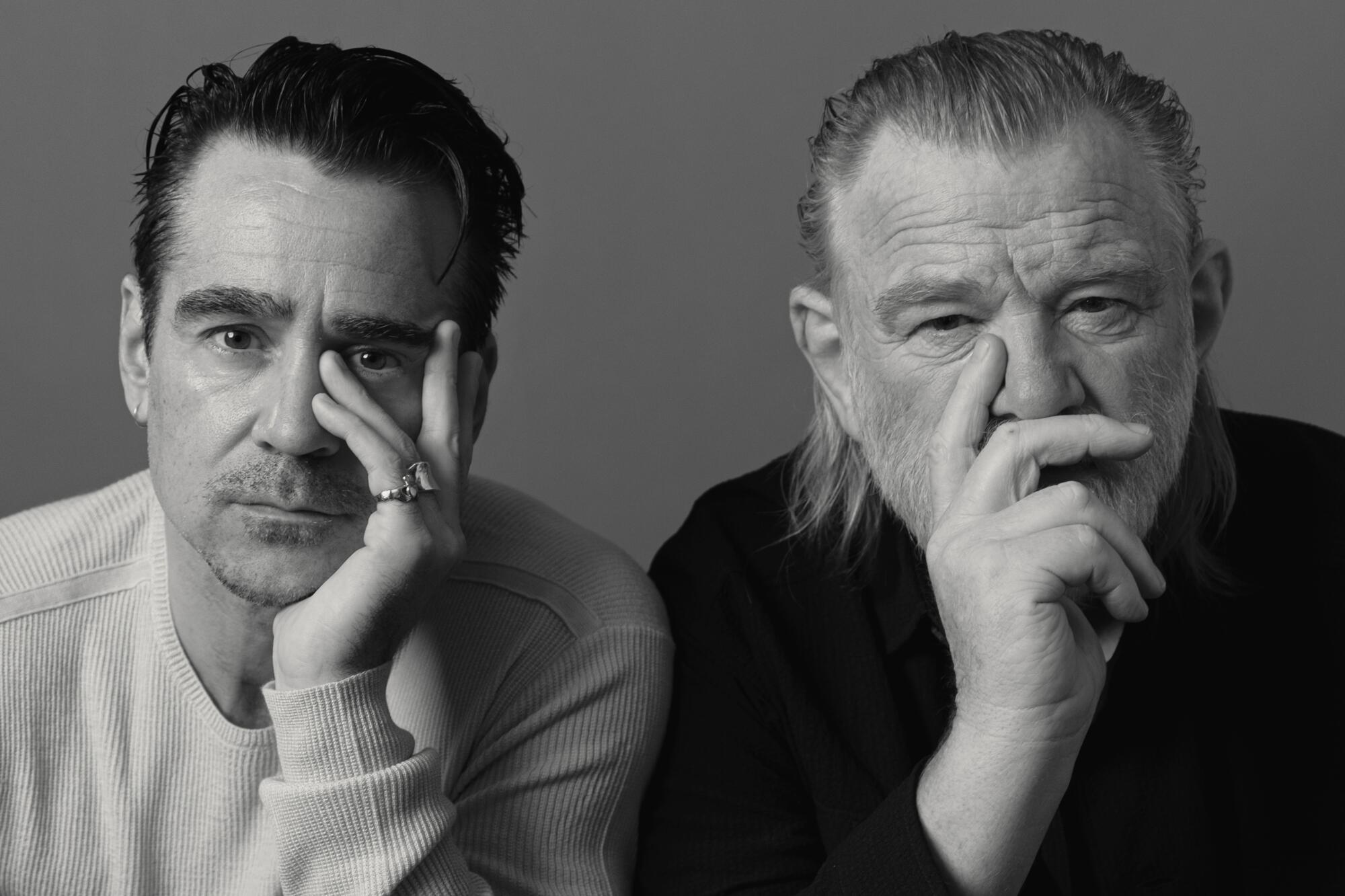
On the surface, Brendan Gleeson and Colin Farrell have little in common beyond their Irish heritage. Separated by more than 20 years, Gleeson is a consummate character actor who didn’t begin acting in films until middle age and has maintained a low profile, while Farrell was shot out of a cannon into stardom while still in his 20s and for years kept gossip columnists busy chronicling his offscreen antics.
But appearances, of course, can be deceiving — and when Farrell and Gleeson shared the screen as a pair of hit men in Martin McDonagh’s 2008 black comedy, “In Bruges,” something clicked. Ever since, the two have been hoping for a chance to work together again. “I was waiting for it to happen, frankly,” Gleeson says. “There’s just something really special about myself and Colin. It doesn’t matter if it’s years between the times we see each other; we just pick up where we left off.”
Now Gleeson, 67, and Farrell, 46, have reunited with McDonagh in the savagely funny yet melancholic “The Banshees of Inisherin,” in theaters Friday. Set on a starkly beautiful, fictional island off the coast of Ireland during the Irish Civil War, the film centers on a much smaller, more prosaic conflict: Gleeson’s brooding fiddler, Colm Doherty, abruptly decides to end his friendship with Farrell’s kindhearted if rather dull Pádraic Súilleabháin. Determined to cut Pádraic out of his life so he can focus on his music, Colm threatens to cut off his own fingers if his old friend so much as speaks to him, creating a rift that soon begins to tear the entire community apart.
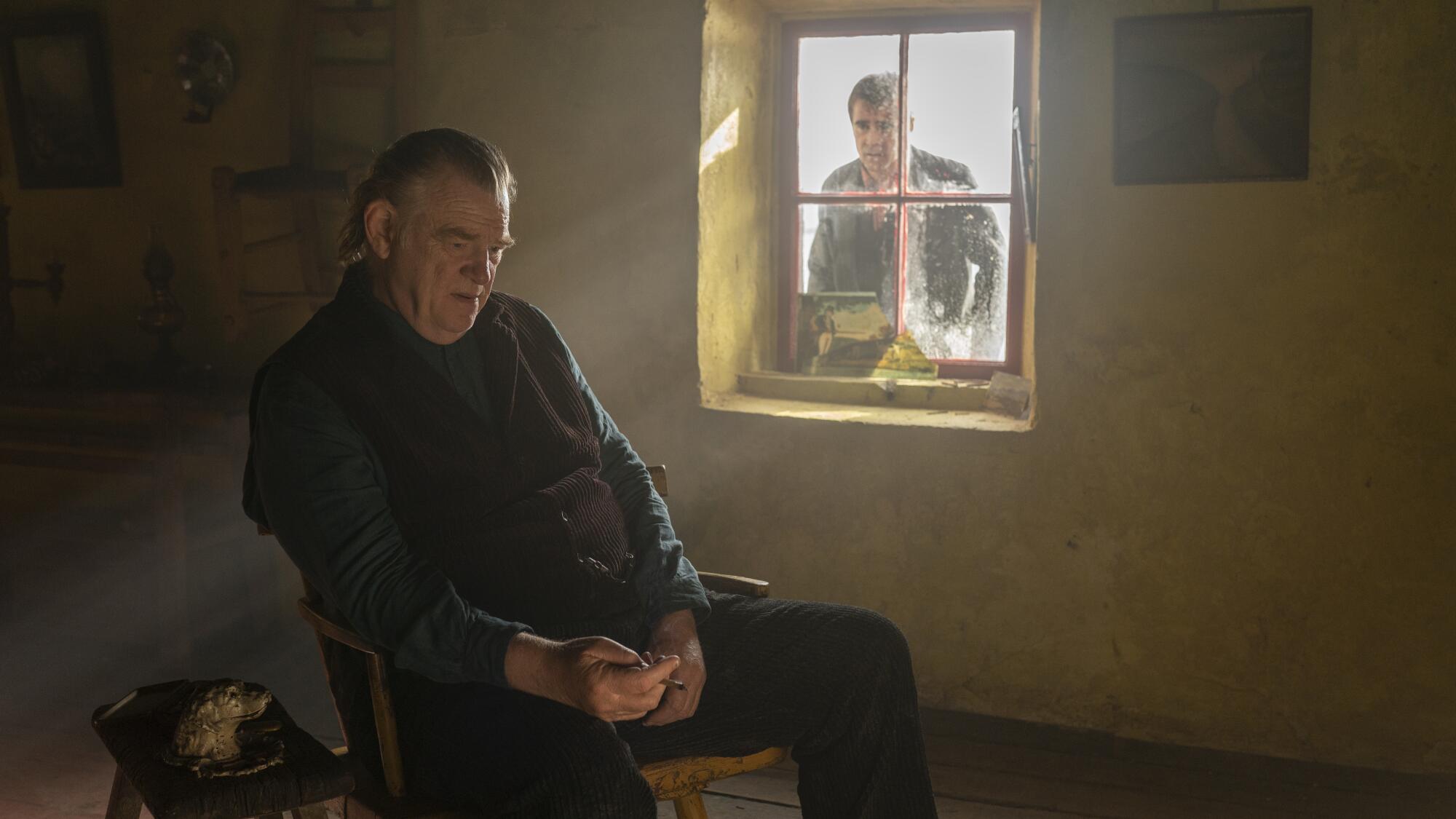
McDonagh’s last film, 2017’s “Three Billboards Outside Ebbing, Missouri,” earned seven Oscar nominations, including best picture, with Frances McDormand and Sam Rockwell earning Oscars for their performances in the film. Following the premiere of “Banshees” at September’s Venice Film Festival, where Farrell earned the best actor prize, Oscar prognosticators have already tagged Farrell and Gleeson as likely contenders in the lead actor and supporting actor categories, respectively.
In writing the script for “Banshees,” McDonagh had Farrell and Gleeson in mind from the start. “If they’d said no, I don’t know if I’d even have done it,” he says. “I definitely wanted to get them back together but to go to very different territory. ‘In Bruges’ is, in some ways, a love story between the two of them, whereas ‘Banshees’ is like the end of that and explores different qualities that they have as actors.”
Just days after Gleeson hosted “Saturday Night Live” for the first time, The Times spoke with the pair via Zoom about playing the bitterest of frenemies — and navigating the perils of Oscar season — while remaining the best of friends.
The Oscars are seven months away but it’s not too early to take stock of the fall’s early arriving contenders.
Before we talk about “Banshees,” Brendan, I have to ask about your experience hosting “Saturday Night Live,” which seemed to come out of left field. Did Colin give you any advice as a former “SNL” host himself?
Brendan Gleeson: I had been badly resistant to the idea — I actually said no. But I listened to Colin because he knows the business better than I do, and I listened to Martin, who was also pushing it. I said to Martin, “Will you come in and help with the monologue and be part of the writing team?” And he agreed. And Colin was saying, “I’ll be there.”
I had a fantastic time. It bumped me back to the ’80s when I was part of a theater company, running around doing a lot of costume changes and wearing wigs and dodgy mustaches.
Colin Farrell: Brendan was reticent about doing it, as I was and many people are — it’s not our stock in trade. But I sold the s— out of it. I wanted him to do it more than I wanted him to do “Banshees” or “In Bruges.” [Laughs.] And it was magic.
You two have had great chemistry onscreen going back to “In Bruges.” Was that connection apparent to you both from the start?
Farrell: From the first day of rehearsal on “In Bruges,” there was a shorthand that was deeply organic and familiar. There was just an ease and a little bit of giddiness as well. There’s an excitement that arises when you’re both open to exploration, to not being quite certain what it is you’re searching for. That kind of certainty mixed with uncertainty is a lovely sandbox to be in, and we had that from the start.
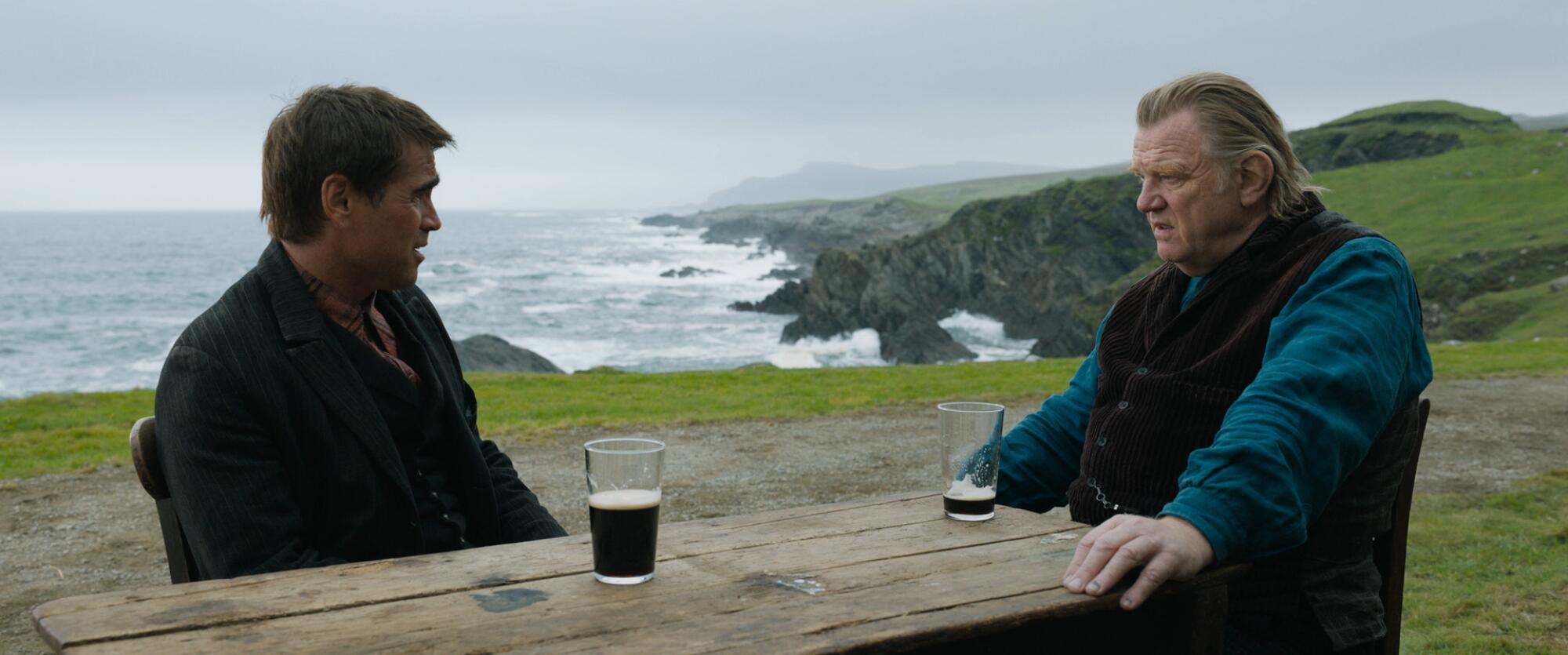
In the years since it came out, “In Bruges” has become a beloved cult film. I’m sure you get people quoting lines back to you.
Farrell: [Dryly] My lines are unquotable in today’s culture.
“Banshees” is a very different film, though. No less funny but also quieter, sadder and stranger. What appealed to you about the idea of reuniting with Martin on it?
Farrell: Martin’s writing really is the tastiest stuff. It’s so funny, but ultimately it’s so moving and emotionally connected to all the things we struggle with as human beings: the need for love, our loneliness, our inescapable leaning into violence at times and the consequences of that violence. And it’s so sneaky — you think you’re watching something that’s irreverent and macabre with this gallows humor, but at its core, there’s a tenderness and a longing and a deep inquisition into what it is to be a human being, how fallible and frail we ultimately are and how much we need each other.
Gleeson: What Martin does with this tiny story is to explore the metaphysical. All the various areas that he goes into, it really does mainline meaning and humanity in a way. That’s what’s connecting with people.
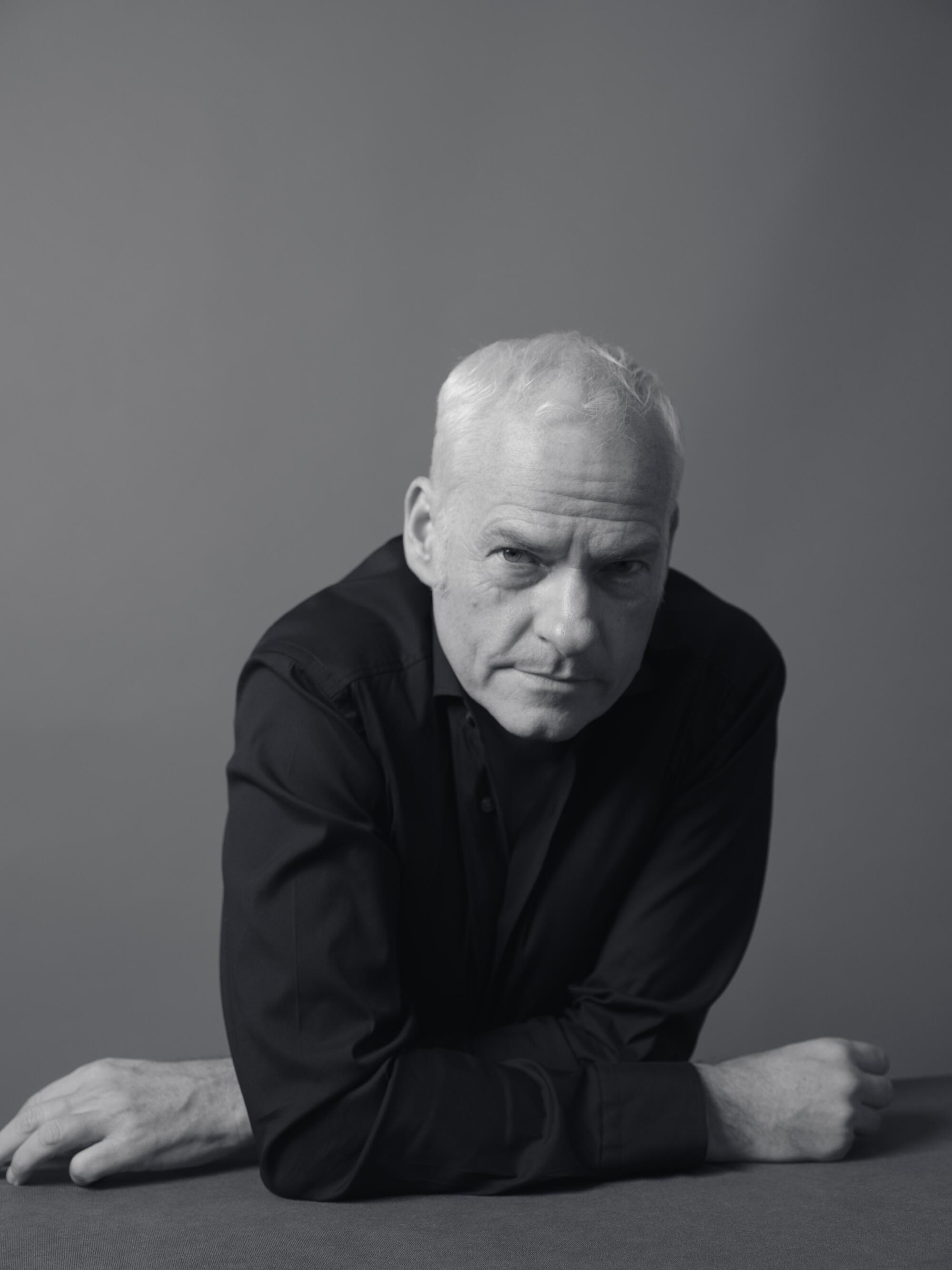
It’s easy for the audience to empathize with Pádraic because he’s so gentle and open-hearted. In some ways it seems you had the bigger challenge, Brendan, getting the audience to understand why Colm is behaving so cruelly toward him and going to such extremes to cut him out of his life. How did you find your own way into the character?
Gleeson: Martin said, “Think about where you are at the beginning of the film,” and suddenly a light came on. Colm is at a place of desperation already before the film starts. He’s screaming for survival. He has to make something happen or he’s in the pit. His abyss is gaping. So I understood that the desperation to make things different is total, and that was what allowed me to be that brutal. Because I knew he wasn’t a monster.
Colin, Pádraic is clearly a bit dim, and everyone in the film talks about how dull he is. But there’s more to him underneath the surface, as we see when he gets drunk and unloads his anger on Colm.
Farrell: There’s a lot more to everyone. There are people that bore me — that’s my experience of them. But a human being cannot be boring. If you can find a way to obviate all your own traumas or your own prejudices and all that jazz, human beings, all 8 billion of us, are fascinating to observe.
Pádraic is pretty dim, and I understood where the accusations of total dullard-ship came from. But he also has a beauty and a purity to him, and how that simplicity and that childlike quality was rendered in the writing was so gorgeous. But it also didn’t take that much to make everything come crumbling down.
It’s not often we see a movie that explores the ups and downs of male friendship as intimately as this one does. Did working on the film make you reflect on your own friendships?
Farrell: Sometimes the work makes you reflect on things in your life, and sometimes things in your life go into the work. I felt like this was more of the latter. I haven’t got many friends in the world, like true friends, and the ones I have I care for deeply, and I feel they care for me in a similar sympathetic way.
Gleeson: I don’t think either of us have an issue with talking about our emotions. But there are other people that really do have that archetypal male-silence thing, and I understand [that] as well. I have friends who talk and friends who don’t talk, and I don’t see a lot of difference in the way it works. Often male intimacy can be communicated nonverbally. Sometimes a good friend is somebody who says nothing, and that’s explored in “Banshees” too. It’s not all spoken, the stuff between us.
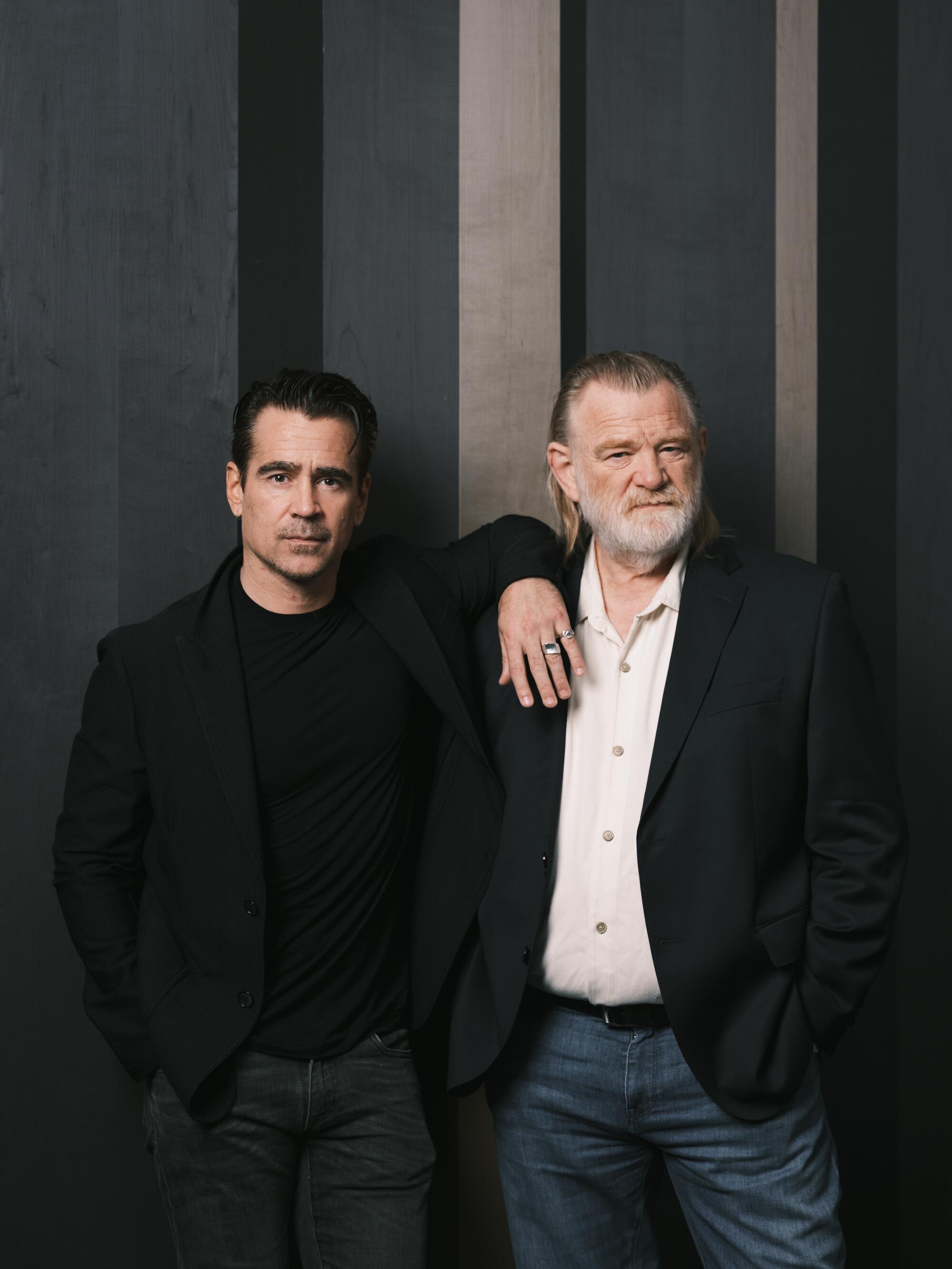
You two are both considered early Oscar contenders for your work in this film. Neither of you has ever been nominated before. Is it hard not to let all of that awards-season chatter get into your head?
Gleeson: It’d be great if it happened and all that. But it’s not why we do it. I don’t like the competitive aspect — it’s apples and oranges — and all the nonsense of it. But it’s part of the business, and it keeps people interested in going to movies. And now, of all times, we need people to be interested in movies to keep all these theaters open for as long as possible.
Farrell: The whole thing is totally ridiculous, but there’s a lot of stuff in life that’s ridiculous that can be fun as well if you don’t take it too seriously. You’re not the first one to ask about it, so of course it’s in my head, but it’s not keeping me up at night. It’d be a laugh if it happens. But if it doesn’t, I’ve already had such a laugh.
To be honest with you, if I had a choice [for who would get nominated] between the two of us, I would choose him, and he would choose me. That’s the gospel truth. If I got a nod and he didn’t, I would be crushed.
Gleeson: Colin won a Golden Globe for “In Bruges,” and he said, “A hemisphere belongs to Brendan.” Which I thought was the sweetest thing. And that’s the way I feel now.
This interview has been condensed and edited.
More to Read
Only good movies
Get the Indie Focus newsletter, Mark Olsen's weekly guide to the world of cinema.
You may occasionally receive promotional content from the Los Angeles Times.
